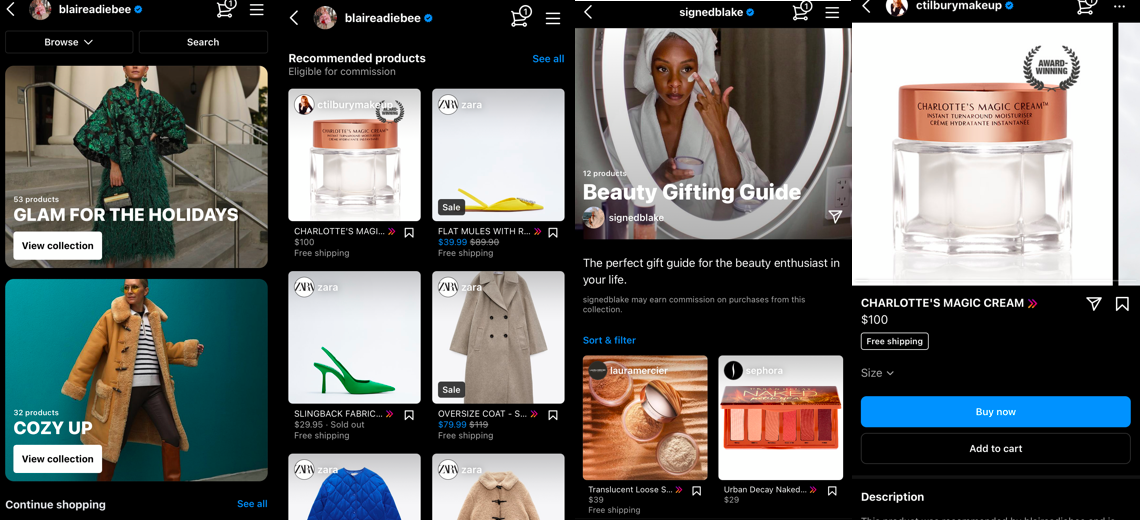For fashion and beauty influencer Blair Eadie, affiliate links have been a big part of her business for over a decade. She was one of the earliest influencers to use RewardStyle back in 2011 and has recently been relying on ShopStyle.
Shopping links shared on Instagram and other platforms by influencers such as Eadie have long meant big revenue for third-party networks. Now, after over a decade, Instagram has finally decided to take a cut.
Eadie (@blaireadiebee, 1.7 million followers) is among several influencers who were selected by Instagram to test out its new pilot in-app affiliate program starting in the holiday season. First announced in June 2021, the feature allows influencers to create a curated shop on their profile using product listings of participating brands. When users click the products and check out on Instagram, the influencers receive a commission. Over 100 brands and retailers are currently participating, including Sephora, Charlotte Tilbury, BareMinerals, Zara, Laura Mercier and Revolve, according to an Instagram spokesperson.
“Affiliate has existed in the influencer space for the last decade, so it makes sense that Instagram is trying to create their own program to keep influencers converting on the platform,” said Eadie.
Other influencers selected for the Instagram pilot include Jean Wang (@jeanwang, 684,000 followers), Blake Gifford (@signedblake, 162,000 followers) and Wendy Nguyen (@wendyslookbook, 1.3 million followers). For the pilot, each of them put together holiday collections featuring fashion and beauty products.
The new affiliate program has more influencers interested in participating.
“I’ve had a lot of inquiries, saying, ‘Hey, that’s so cool. How do I create a collection?’ So there was definitely a lot of buzz within the influencer community,” said Eadie.
Ad position: web_incontent_pos1
In general, affiliate commissions for influencers range from 6-20%, according to an industry source, with 9-12% being the most common.
The affiliate shopping feature is the latest of Instagram’s ongoing developments in social shopping, which in 2021 included the introduction of the Drops feature and the expansion of shoppable livestreams.
“Social commerce can be incredibly effective because it seamlessly blends social experiences and e-commerce transactions through a single path to purchase, all enabled by a single platform,” said Audrey Depraeter-Montacel, global beauty lead at professional services company Accenture.
The social commerce industry is expected to expand three times faster than traditional e-commerce to reach $1.2 trillion by 2025, according to Accenture. A 2021 survey by Accenture found that 52% of millennials said they are more likely to get inspiration from other users or influencers when shopping through social commerce than when shopping through e-commerce, followed by 48% of Gen-Z respondents.
Instagram can be especially useful for facilitating shopping.
Ad position: web_incontent_pos2
“My first post [using the affiliate feature] was tagging a number of different going-out pieces. mostly focused on Zara as the retailer. And pretty immediately, I saw a lot of sales, which is great,” said Eadie, whose most popular item has been a sparkly Zara top. Other items she’s featured include Charlotte Tilbury’s Magic Cream and holiday party and cold-weather collections of fashion items from Zara, The Yes and Revolve. She noticed that sales happen much more quickly on Instagram than when she shares affiliate links on her website.
For her part, Blake Gifford started by creating a beauty gift guide. Her shop features brands including Laura Mercier and BareMinerals, as well as multiple Sephora listings including items from Urban Decay, Too Faced, Drunk Elephant and Fenty Skin.
Influencers see big potential for the feature.
“At the end of the day, Instagram has so many eyeballs, and they have so many potential consumers,” said Eadie. “They’re really trying to build a lasting platform that takes into account the future and also how people are using [the platform] on the influencer side.”




